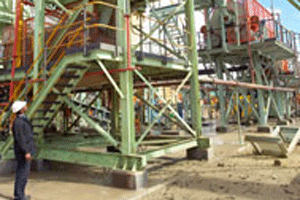
LONDON — Fears that Zimbabwe’s government will strip foreign mines of half their assets without compensation are unfounded, according to Kalaa Mpinga, chief executive of Mwana which has gold and nickel operations there.
Report by Reuters
“There is a lot of noise, but we’re having a good conversation with the government,” Mpinga said.
There is a draft proposal by President Robert Mugabe’s party to amend its “indigenisation” law, by which foreign companies must be 51% owned by local black people, under which companies would not be compensated for their stakes.
London AIM-listed Mwana runs Zimbabwe’s largest producing gold mine — Freda Rebecca — but Mpinga, interviewed in London, said he doubted the proposal carried weight.
“I have seen cases where you have a white paper which comes out of some government department and is widely distributed and it’s just some guy who wants to see what the reaction is.”
Born and raised in the Democratic Republic of Congo (DRC), Mpinga was previously a director at Anglo American. With Mwana’s other main project located in DRC, he has longstanding experience working under testing political circumstances.
Zimbabwe’s indigenisation and empowerment minister, Saviour Kasukuwere, told local media that there were no immediate plans to amend the law.
- Chamisa under fire over US$120K donation
- Mavhunga puts DeMbare into Chibuku quarterfinals
- Pension funds bet on Cabora Bassa oilfields
- Councils defy govt fire tender directive
Keep Reading
But with an election expected this year, the coalition government is eager to raise funds, having publicly admitted it cannot afford the poll, stoking fears the government will resort to seizing assets.
Another option is a new tax on the mining sector which the government may introduce, Finance minister Tendai Biti said during a visit to London.
The indigenisation law has put investors on edge, particularly because the terms under which stakes are acquired remains vague.
Mwana set to increase production
Mpinga, who has worked in Zimbabwe through the worst of the turmoil and hyperinflation, has a simpler view.
“If they don’t pay what I want, they won’t get it,” he said with a smile.
“From my experience, the government is very reasonable.”
In January, Impala Platinum, the world’s second-largest platinum miner, agreed to sell a majority stake in its Zimbabwe unit to local black investors for US$971 million, with the local unit lending investors the money.
Political concerns aside, Mwana is ramping up production. Its shares jumped more than 10% last week after an operations update showed a 36,8% increase in gold production from Freda Rebecca, despite a failure in a leach tank where gold is extracted from the ore.
“We have more than delivered on all the things we said we would… If it hadn’t been for the leach tank we would have far exceeded expectations,” Mpinga said.
With commodity prices falling Mwana has prioritised reducing its costs and increasing production. A pilot plant to test the feasibility of retreating left-overs from the main production process, known as tailings, is expected to be ready in July.
Mpinga also said a plan on developing the refinery and smelter at Mwana’s nickel operations, run through Zimbabwe-listed Bindura Nickel Corporation, would be in place by the end of the year.
The mine and plant were restarted last year after production was put on hold in 2008, due to weak nickel prices and challenges posed by hyperinflation.
“At every level the government wanted the mine to start. That’s what I see, the rest is just noise,” Mpinga said.










